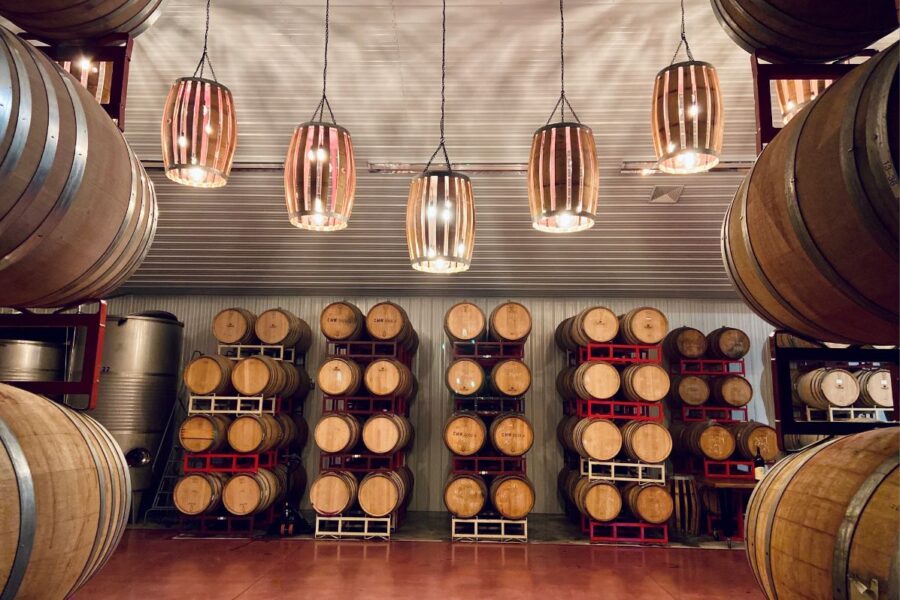
South Jersey’s Growing Winery Scene
When Todd Wuerker assesses the burgeoning winery scene in Cape May County, he doesn’t view fellow vintners as competition. Okay, he does a little bit. But mostly, he understands the value of critical mass and how if current vineyards and those to come continue to grow and flourish, the entire area will gain attention and create opportunities for all to prosper.
The Hawk Haven Vineyard and Winery he and his wife, Kenna, started in 2008 in Rio Grande has experienced considerable growth, while also helping to prove to skeptics that the area has tremendous potential.
“When we started, we would get customers who came in saying, ‘New Jersey can’t grow grapes and make wine,’” Wuerker says. “Now, people come in and say, ‘We’ve heard great things.’ It’s been a huge progression and perception of what’s happening here.”
Although no one will confuse New Jersey with Napa Valley, the last decade-plus has seen the development of a flourishing winery scene throughout Cape May County that has added another attraction to an area that has long been known primarily for beaches and boardwalks. Just as South Jersey has become a much more robust restaurant area, so too have wineries become more recognized for their products and the experiences they offer visitors.
In addition to Hawk Hill, there are Cape May Winery and Vineyard in North Cape May, G&W Winery in Rio Grande, Jessie Creek Vineyard and Winery in Cape May Courthouse, Natali Vineyards and Winery, also in Cape May Courthouse, Southwind Vineyard in Deerfield Township, Turdo Vineyard and Winery in North Cape May and Willow Creek Vineyard and Winery in West Cape May.
While Wuerker understands that more wineries create more competition, he also knows that if there are several options available to people, they will more likely decide to experience what’s available at as many as possible, just as they don’t eat simply at one bistro.
“I don’t see it as competition,” Wuerker says. “Whatever is happening is forcing us to continue to make better wines and get notoriety. With more wineries comes more recognition. We can build a cottage industry so that there are more reasons to come to Cape May than just the beaches.”
The seven Cape May County wineries and several others throughout the southern part of the state offer various opportunities for tastings, tours, dining and special events. Some, like Willow Creek Winery in West Cape May, have developed a significant wedding business. Others can offer opportunities to host smaller gatherings, particularly bachelorette parties. But the main focus of each is producing the best wine possible thanks to maturing growth processes and the experience gained by winemakers.
Michael Mitchell has been at Cape May Winery and Vineyard for 15 years and worked his way to chief winemaker after beginning as a worker in the vineyard. He says “60 percent” of the property’s output is “estate wine,” or from grapes grown on the premises. The goal is to expand that share to make even more wine from what is grown on the land it owns. As the individual wineries work to produce better vintages, they are happy to be part of a growing scene that is making the area a destination for oenophiles and casual wine fans.
“That’s huge,” Mitchell says. “One reason is for the economy. People can come down to do a wine tasting and hit five or six wineries in a weekend. Second, if you want to be taken more seriously in the world of wine, it’s about having a region. You hear about Napa and other growing areas. If we want to take wine here to the next level, we have to develop the area and the brand.”
As far back as two centuries ago, farms in West Cape May used to provide all of the produce for the Cape May peninsula. One of those properties, which used to grow soybeans, is now the Willow Creek Winery, which sits on a 50-acre property. In 2000, Barbara Bray-Wilde purchased the farm and converted it into a winery. She planted grape vines in 2004, and five years later the first vintage debuted.
Today, Willow Creek is a thriving concern with a main tasting area/restaurant and cottages which visitors can rent throughout the year. Hamilton Wilde, the winery’s Director of Events, says that while some areas of the country are trying to replicate what’s being done in Napa, the Cape May wineries have more of an “old world” European style.
“The sandy soil here is wonderful for drainage, and we get fantastic cross breezes from the bay and the ocean,” she says. “The water doesn’t sit on the grapes, and there is a lack of mold. It’s a climate similar to Bordeaux, France.”
Mitchell agrees. He says having water on both sides of the peninsula creates a “micro-climate” that is more temperate than the rest of the states. That makes for a longer growing season, because the winter isn’t too harsh, and the summer doesn’t feature long stretches of beastly heat.
The result is a menagerie of wines that offers products for casual drinkers to full-on enthusiasts. Richard Kaplan, who bought Natali two years ago from founder Al Natali, reports his winery has accumulated 125 medals during its 20-year existence. It has 15 varieties, including a bold chardonnay and the dry, three-red blend Nonno’s Cellar, which Kaplan says is “extraordinarily popular.”
Kaplan’s long-term plan for the winery is to increase production. To that end, he purchased a farm in Brotmanville, Salem County just off Route 55 and has planted five acres of grapes, to go with the nine active acres on the vineyard’s premises. Natali produces about 100 cases of wine each year, which Kaplan does not deem enough for profitability – or for the state’s liquor stores to carry the winery’s product. He hopes within three years to expand production and distribute the wines more widely throughout the state.
Natali does sponsor events and has been the site of weddings. Since radio and TV personality Mike Missanelli is a part owner, he was at the property during Memorial Day weekend to meet and interact with guests. While Kaplan understands the value of welcoming visitors – and plans to double the tasting area – he is more interested in making better wines and considers selling the experience secondary. For him to do that, increasing the amount Natali makes is paramount.
“We have the potential to make world-class wine in substantial quantities if we can grow enough grapes,” he says.
expansion has been a priority at Cape May Winery, too. Since Mitchell started, he has seen what he describes as “crazy growth,” with production increasing and the physical plant expanding. Although the winery is at capacity now, that doesn’t mean there isn’t an opportunity to improve.
“We have to focus now on continuing to develop our estate wines and getting better at growing fruit and making wine,” Mitchell says.
That goal is repeated by winery owners and vineyard workers throughout the area. It is important to have a great experience for visitors, and the growing number of properties in Cape May County has created a destination for those who love wine, as well as people who simply want something more to do when they head to the Shore. The growing community and options – along with the dozens of wines to be sampled and purchased – have brought a new personality to the area, largely in under two decades. The future is bright, and there is little doubt the area’s wine scene will continue to thrive.
“There is California wine country, and we have created our own South Jersey wine country,” Wilde says. “People are coming here just for the wineries.”

